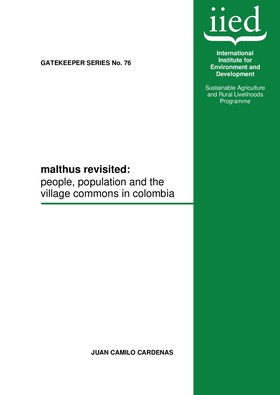Malthus Revisited: People, Population and the Village Commons in Colombia

Traditionally, communities in the developing world have been labelled as the source of environmental problems as they extract and use goods and services from the environment, sometimes beyond the natural regeneration rates of eco-systems. Usually this is attributed to population densities growing at an unsustainable rate.
This paper argues against the common proposition that population growth alone is a threat to natural resources. It contends that technological and structural factors play a role in determining the net effect of population density on the conservation of key local environmental public goods (called village commons in this paper) such as soil, watershed regulation or natural vegetation, that affect the flow of ecological benefits to the community. Such an effect takes place through household decision-making about farming choices such as land and input use. The interaction between certain farming practices and social relations such as the distribution of land may create positive or negative net effects of population in the provision of environmental public goods or degradation from these village commons.
Cite this publication
Available at https://www.iied.org/6136iied